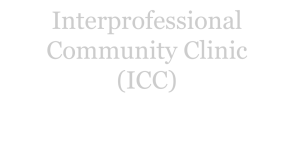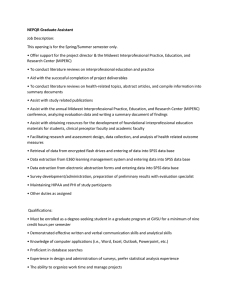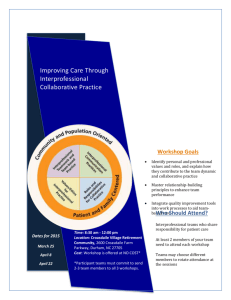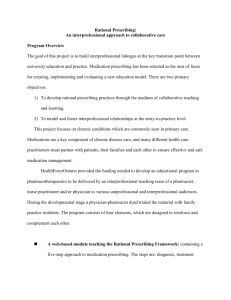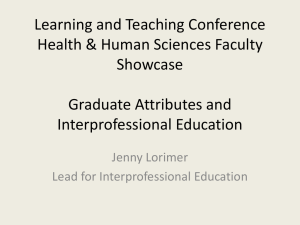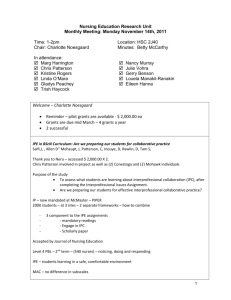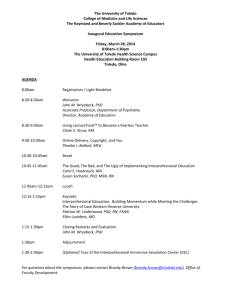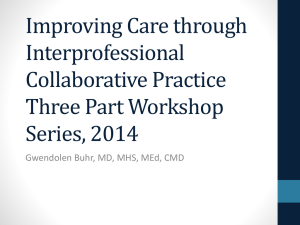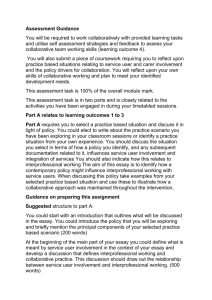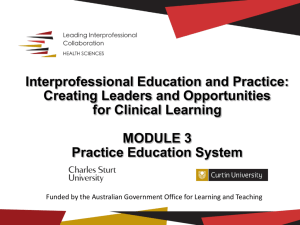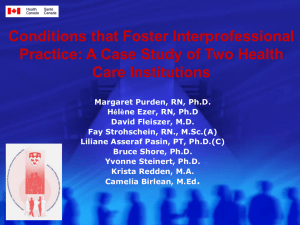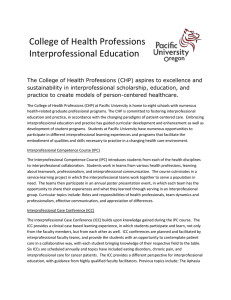UofT PAIN WEEK DESIGN EXPERIMENT
advertisement
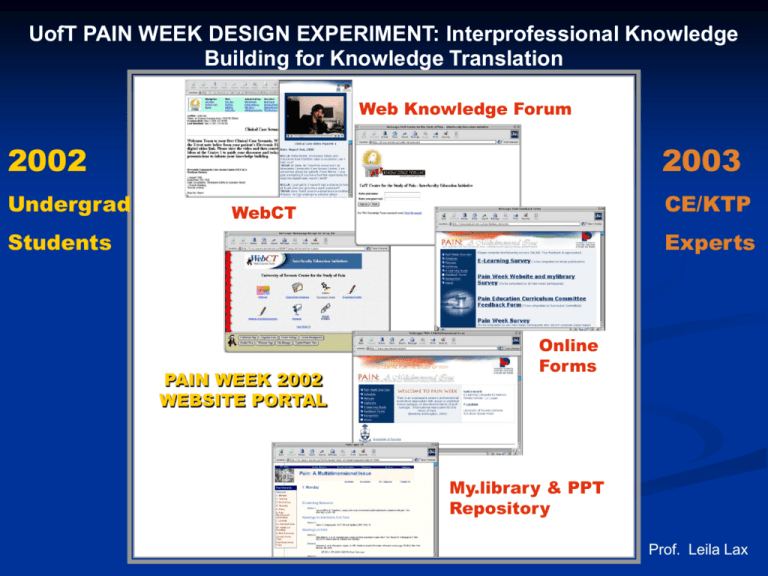
UofT PAIN WEEK DESIGN EXPERIMENT: Interprofessional Knowledge Building for Knowledge Translation Web Knowledge Forum Web Knowledge Forum 2002 Undergrad 2003 CE/KTP WebCT Students Experts PAIN WEEK 2002 WEBSITE PORTAL Online Forms My.library & PPT Repository Prof. Leila Lax Iterative Design Experiment Pain Week 2002 (KF2 & WebCT) Interprofessional student E-Learning model Pain Week 2003 (Blackboard & KF4) Scaled-up (70 to 560 students) & fully integrated Development of KB/KF model for Continuing Education/Knowledge Translation (experts) Pain Week KB Goals To engage learners in discourse about the most cutting edge knowledge of pain mechanisms, assessment & management. To create opportunities to connect discourses within and between communities opening new possibilities for barrier-crossing in interprofessional education & collaborative KB. Knowledge Building Theoretical Framework “Learning is an internal, unobservable process that results in changes of belief, attitude or skill. Knowledge building by contrast, results in the creation or modification of public knowledge...The goal is to advance the frontiers of knowledge (as they are currently perceived).” (Scardamalia, M. & Bereiter, C. (2002). Knowledge Building. In Encyclopedia of Education, Second Edition. New York: Macmillan Reference, USA.) Redefining Expertise Staged model (“end-state”) Dreyfus & Dreyfus, 5 Steps from Novice to Expert & Schmidt, Norman & Boshuizen “illness to instance scripts” Process model (“cognitive reinvestment”) Bereiter & Scardamalia, progressive problem solving at increasing levels of complexity (Bereiter, C. & Scardamalia, M. (1993). Surpassing Ourselves: An Inquiry into the Nature and Implications of Expertise. Peru, Il: Open Court, USA) IPE Expert KB/KT Database Multimedia & Virtual Patient Unfolding Clinical Case Scenarios Standardized Patients Real Patients Future: Expert Demos Future: Participant Video Building-on Diverse Ideas INTU & A Better Theory Optimizing & Improving Ideas Providing Authoritative Resources Creating High Level Summaries Linking & Multi-Referencing Reflecting Integrating Learning & Knowledge Building Supporting Evidence-based KB Using Visuals for Deep Understanding Working with Real Ideas, Real Problems KF Database = Knowledge Objects Repository Knowledge Building Challenge Advance beyond knowledge telling 2002: student database Shallow KB = knowledge sharing & idea exchange 2003: expert database aiming for Deep KB = knowledge transformation & innovation Methods Design Experiment Methodology (Brown, 1992; Collins, 1992; The Design-Based Research Collective, 2002) Ethical approval of research protocol Self-selected volunteers (enthusiasts) n=16 Analyses Attitudes & Opinions Survey ATK KB Measures KB Qualitative Indicators Pain Conceptions/Misconceptions Pre- & Post-test on Pain Beliefs Reflective Feedback Survey (4 months later) Experts Attitudes & Opinions KT Survey RESULTS Response rate = 12/14 (86%) Demographics The program or faculty I am currently registered/associated with is: Nursing=7, Medicine=1, Pharmacy=2, Social Work=1, Physical Therapy=1, Occupational Therapy=0, Dentistry=0 I am: Female=11 Male=1 My age group is: 30-39=5 40-49=7 Did you find this interprofessional continuing education experience useful? Yes=11/12 Was there purposeful discourse online between participants? Yes=11/12 Did you acquire new knowledge? Yes=11/12 Do you think as a result of this course you will change your approach to interprofessional practice? Yes=7/12 Example: “I have been fortunate to work with some great teams but this did help in allowing me to see each individuals focus and not expecting any one individual to carry all the knowledge.” Do you think as a result of this course you will change your approach to pain assessment & management? Yes=9/12 Example: “I thoroughly enjoyed reading the comments made by the other participants, and realize how narrow focused I am and how much of a broader perspective the other members bring to the table. They truly have expertise that I never fully appreciated. I have learned that management of pain encompasses much more than merely drug therapy - but should focus on the whole person. We need to look at emotional, financial, personal and other supports.” Would you like to see more E-Learning CE/KTP courses made available? Yes=11/12 Based on my experience of E-learning, I would recommend it to a colleague. 10/12 strongly agree/agree Overall I would rate my E-learning experience as: 83.3% excellent/very good/good KB Idea Diversity “Socio-cognitive dynamics: Ideas diversity is essential to development of knowledge... To understand an idea is to understand the ideas that surround it, including those that stand in contrast to it. Idea diversity creates a rich environment of ideas to evolve into new and more refined forms.” Technological supports: link & reference KB Community Knowledge, Collective Responsibility “Socio-cognitive dynamics: Contributions to shared, top-level goals…are prized…as much as individual achievements. Team members produce ideas of value to others and share responsibility for the overall advancement of knowledge in the community.” Technological supports: build-on, link, summarizing Future Directions KB/KF progressive iterative design experiment, addressing the continuum of health professional education from undergraduate to knowledge translation in practice, to advance pain education & interprofessional outcomes. Acknowledgements Research Support: Numerous UofT Faculty & Dept. in-kind contributions; UofT Academic Priorities Fund, Council of Health Sciences and Social Work Deans, Interprofessional Education Implementation Committee, Dr. C. Whiteside, Chair, Associate Dean, Faculty of Medicine; University of Toronto Centre for the Study of Pain, Dr. M. Salter, Director; and Institute for Knowledge Innovation and Technology, Dr. M. Scardamalia, Director, OISE/UT Collaborators (research, case writing & facilitation): Dr. J. Watt-Watson (Nursing), Dr. P. Pennefather (Pharmacy), Prof. J. Hunter (PT), Dr. M. Scardamalia (IKIT) and Dr. A. Gordon (Mt. Sinai Hospital)
